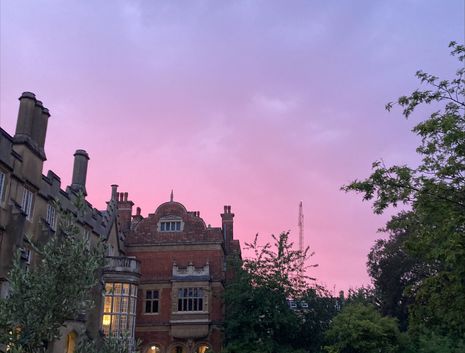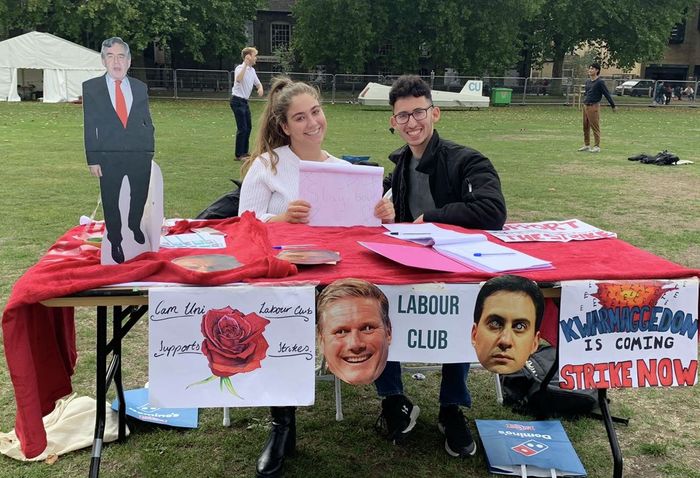Barbieland or Kendom? Girlhood in Cambridge
Would Barbie be proud of the progress shown in womanhood at Cambridge?

Last week, I donned pink and made a pilgrimage to the Grafton Vue for the film occasion of the year. Barbie was all I had imagined and more – it was fun and poignant all at once, a celebration of feeling and emotion, of love, life and female friendship. Oppenheimer was amazing, but Barbie felt lived in. It wasn’t perfect – at points cliché and not always the truest representation of feminism – but in it I saw the essence of the female experience. I saw a reflection of myself.
Barbie made me feel inspired. I recognised in it things I see in my life and studies at Cambridge. This is because - despite being under a ridiculous amount of pressure – no one here is removed from “girlhood” as a state of being (female friendships, heartbreak, shopping trips). Sometimes this pressure makes girlhood a bit more intense. But it’s still there, always, in the background. I made my outlook email pink. I paint my nails to sit in the library and read John Stuart Mill. Sometimes I send a supervision essay in late because I spent the past three days listening to Phoebe Bridgers and pondering what it was about me that made me just not good enough. I study at one of the best universities in the world, but maybe if my thighs were just that bit smaller, I would be enough. Barbie deals with inadequacy in the female experience head-on.
Barbie reminded me of the women I know at Cambridge. Fiercely confident, intelligent and independent – often almost archetypes of themselves – Cambridge’s Barbies always seem to have “something about them” that is difficult to quantify. I am always in awe of just how impressive the women around me are. And not just this, but the obstacles I know they will have scaled to simply be here in the first place. Many Cambridge Barbies, I would argue, have probably spent their entire lives being called bossy. Olympiad winners, orchestra performers, Blues athletes. HSPS Barbies always have the coolest outfits. Rowing Barbie wakes up at five every morning. Medicine Barbie casually takes 14 end of year exams but is still in Lola’s every week.
“I think Barbie would be horrified if someone dropped her in the Arc Cafe”
Margot Robbie’s stereotypical Barbie is perfect. She’s blonde, beautiful and accomplished. But that still isn’t good enough for her. The perfection of Gerwig’s Barbieland and the Barbies within it are a visual representation of just how ridiculous this is. And despite this obvious absurdity, so many of us who saw the film could relate to America Ferrara’s speech. “It is literally impossible to be a woman” she says: “You are so beautiful, and so smart, and it kills me that you don’t think you’re good enough”. I saw in a crying Margot Robbie the women I see, know and love – not always blonde, but beautiful and accomplished – who despite everything (and I mean that in the fullest sense of the word) feel “not enough”. “We have to always be extraordinary, but somehow we’re always doing it wrong”. It is girlhood’s biggest curse.
Following these realisations, I felt ready to ask the perennial question. In an institution chockfull of these fiercely confident, intelligent and independent women, is Cambridge a Barbieland, or does tradition, consensus and culture confine it to a Kendom?
In Barbieland there wouldn’t be such disparity in the classification of degrees. Barbieland wouldn’t need a “women’s campaign” or a period project or a Barbieland “women in business”. This would be the norm. Of course, seeing Cambridge in this way is slightly flawed. In Gerwig’s Barbieland women rule everything. There’s an all-women supreme court, a woman President, women astronauts and lawyers and journalists. I’m not advocating for a Ken purge.
Instead, I would argue that Cambridge could be significantly improved if it was a bit more Barbie. From an outsider’s perspective, it probably seems a default Barbieland anyway. In theory, women have all the same rights as men at Cambridge. We take the same courses, lectures and exams alongside the Kens. But in reality, I think Barbie would be horrified if someone dropped her in the Arc Cafe. Because despite the Cambridge bubble, it is still very much representative of the rest of the “real world”. The achievement gap (still) exists, my limited knowledge of some, more traditional, Cambridge institutions would suggest that they are very much “Mojo Dojo Casa House” -esque and we still can’t walk home alone at night.
I don’t think the answer to Cambridge being more Barbie is painting the Seeley Library pink. In Barbie the Barbies simply distract the Kens and change everything back to how it was and here lies the problem. It was not until 1948 that Cambridge began to offer degrees to women. Making Cambridge Barbieland requires looking forward, not back. There is plenty of looking forward to be done.
 News / Cambridge students set up encampment calling for Israel divestment6 May 2024
News / Cambridge students set up encampment calling for Israel divestment6 May 2024 News / Cambridge postgrad re-elected as City councillor4 May 2024
News / Cambridge postgrad re-elected as City councillor4 May 2024 News / Some supervisors’ effective pay rate £3 below living wage, new report finds5 May 2024
News / Some supervisors’ effective pay rate £3 below living wage, new report finds5 May 2024 Fashion / Class and closeted identities: how do fits fit into our cultures?6 May 2024
Fashion / Class and closeted identities: how do fits fit into our cultures?6 May 2024 Features / Cambridge punters: historians, entertainers or artistes? 7 May 2024
Features / Cambridge punters: historians, entertainers or artistes? 7 May 2024






